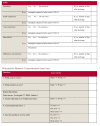Long-Term Symptoms among Hospitalized COVID-19 Patients 48 Weeks after Discharge-A Prospective Cohort Study
- PMID: 34830580
- PMCID: PMC8618663
- DOI: 10.3390/jcm10225298
Long-Term Symptoms among Hospitalized COVID-19 Patients 48 Weeks after Discharge-A Prospective Cohort Study
Abstract
Follow-up studies of COVID-19 survivors have been performed to characterize persistence of long-term symptoms, but data are scarce on one year of follow-up. This study provides data from 48 weeks of follow-up after discharge. All patients discharged from the Department of Infectious Diseases at Aarhus University Hospital, Denmark between 1 March and 1 July 2020 were followed for 48 weeks. In total, 45 of 66 eligible patients were interviewed after 48 weeks. The median age was 57 (IQR 51-70) years, the majority were female (53%) and Caucasian (87%). Median BMI was 28.1 (IQR 24.8-32.6) kg/m2. One or more comorbidities were registered among 62% of the patients. In total, 39 out of 45 (87%) interviewed patients reported persistence of at least one symptom 48 weeks after hospitalization with COVID-19. Most frequently reported symptoms were fatigue, dyspnea, and concentration difficulties. This study provides new long-term data following COVID-19, contributing to the accumulating data of COVID-19 sequelae. Many patients suffer long-term sequelae and further research is urgently needed to gain further knowledge of the duration and therapeutic options.
Keywords: COVID-19; hospitalized patients; long-term complications; long-term symptoms; prospective studies.
Conflict of interest statement
The authors declare no conflict of interest.
Figures
References
Grants and funding
LinkOut - more resources
Full Text Sources



